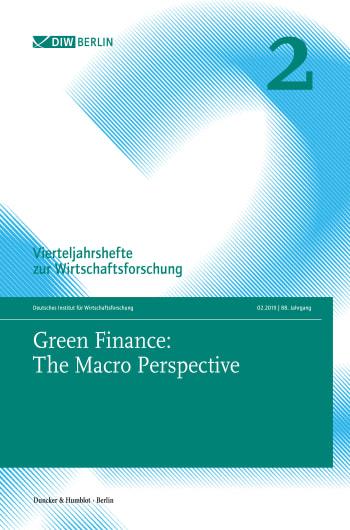Vierteljahrshefte zur Wirtschaftsforschung. Heft 2, 88. Jahrgang (2019)
Beschreibung
Is the Paris Climate Agreement of 2015, with its ambitious goal of the temperature increase compared to pre-industrial levels not to exceed 1.5 degrees Celsius, achievable? This certainly depends on the policy efforts undertaken.
Climate scientists point to the disastrous consequences of unmitigated climate change: an increasing frequency of severe weather disasters, losses in biodiversity, rising sea levels with the associated large-scale migration from low-lying territories, among others. Economists debate the pricing of CO2 emission through measures such as capand-trade and a carbon tax. Young generations organize street demonstrations for a better future. Multilateral institutions, including the World Bank, IMF, OECD, ILO, the EU-Commission, and numerous central banks design policies to mitigate and adapt to climate change. Recently, financial markets (investment firms, pension funds, sovereign wealth funds, and university endowments) have been mobilized to support the financing of climate policies. Although the financial markets are traditionally characterized by the primacy of shareholders’ short-termism, the threat of stranded fossil fuel assets and long-run benefits of renewable energy investments have moved discussions on green finance to the front.
These two volumes on Green Finance contain many pathbreaking contributions from financial market participants, the EU-Commission, the IMF, the World Bank, central banks, academics, and practitioners. Significant work on sustainable policies, pathways to a fair transition, financing instruments for the energy transition, the favorable role of current macroeconomic conditions, the low financing costs of green investments, and the available fiscal space are presented in the first volume. The second volume contains corresponding case studies on agriculture, innovative SMEs, industry sectors, and countries.
Why are Political Parties and Governments still waiting?
Inhaltsübersicht
Claudia Kemfert, Dorothea Schäfer, Willi Semmler, and Aleksandar Zaklanr
Green Finance: The Macro Perspective
Financing the Green Transition
Duco Claringbould, Martin Koch, and Philip Owen
Sustainable finance: the European Union’s approach to increasing sustainable investments and growth – opportunities and challenges
Dirk Heine, Willi Semmler, Mariana Mazzucato, João Paulo Braga, Michael Flaherty, Arkady Gevorkyan, Erin Hayde, and Siavash Radpour
Financing Low-Carbon Transitions through Carbon Pricing and Green Bonds
The Role of Central Banks and States
Paul De Grauwe
Green money without inflation
Andreas Breitenfellner, Wolfgang Pointner, and Helene Schuberth
The potential contribution of central banks to green finance
Francesco Lamperti, Mariana Mazzucato, Andrea Roventini, and Gregor Semieniuk
The green transition: public policy, finance, and the role of the State
Toward a global climate policy architecture
Katharina Erdmann, Aleksandar Zaklan, and Claudia Kemfert
Linking Cap-and-Trade Systems and Green Finance
Authors
Call for Papers

